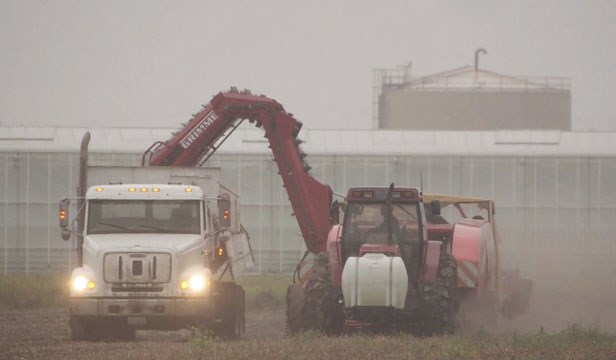From drought to deluge, climate change means farming the extremes.
Farming is the art and science of managing the unmanageable. After three months of drought-like weather conditions in the summer of 2015, Delta was pounded by storms. Heavy rains and extreme wind whipped the coast and caused localized flooding in some areas.
For Brent Harris and other farmers around Delta, it brought back memories of a harvest washed away by heavy rains late in the summer of 2010.
"It wasn't one particular killer storm, it just started raining and didn't stop," recalls Harris, who lost his potato and bean crops that year. "Everything got so saturated that bean harvesters and combines couldn't go in the field and we had to abandon the crops."
According to climate change projections, extreme rainfall events in Delta are expected to double in frequency by 2050. Depending on when the rain falls, it can prevent farmers from getting into waterlogged fields to plant or harvest, increase soil erosion and nutrient runoff, and damage crops. The extent of damage from excessive rainfall often depends on how quickly farmers can get water off their fields, making effective drainage critically important. The existing network of private and publicly managed drainage ditches help drain farm fields. The Corporation of Delta's engineering department plans for and constructs improvements to the public drainage system,
in addition to ongoing maintenance, in an effort to make the system more responsive to severe rainfall.
Laser leveling fields also helps to make sure water doesn't collect in low spots and installing tile drains, another drainage technique, gets rid of subsurface water, but both options come at a cost.
"Installing drainage tile is an expensive proposition, and what makes it tough is the reality of land ownership here," Harris explains. "Land is very expensive, and while farmers own some land, the majority is leased. That means we're looking at doing expensive capital improvements on land we may or may not have in the future."
Researchers at UBC, along with the Delta Farmers' Institute and local farmers, including Harris, are working together to evaluate practices for improving drainage in Delta's agricultural lands.
The project is part of the B.C. Agriculture Food Climate Action Initiative's Farm Adaptation Innovator Program.
The program supports projects that help build the on-farm capacity of farmers to adapt to climate change impacts, and is funded by Growing Forward 2, a federal-provincial, territorial initiative.
Sean Smukler, assistant professor of applied biology and soil science at UBC, is leading the study with the aim of demonstrating approaches and then providing planning tools to help farmers make decisions about their drainage options.
"Drainage is a problem in Delta. The area's close proximity to the ocean and Fraser River, coupled with fine textured soils and low lying topography, poses a set of unique challenges to effective field drainage," says Smukler.
"If we get rain before the farmers get crops out of the field, it's disastrous."
Demonstration sites are being set up on two fields in Delta using different spacing configurations of drainage tile to assess below ground drainage options. The surface of the soil is also receiving treatments, with farmers planting vegetation in the forms of cover crops and grassland set-asides.
They are looking for the best way to get the water off the fields to prevent lost working days, or worse, lost crops.
"It's a big investment to do this kind of research, so to just do it on one farm, one crop, one soil type would really limit applicability to other farmers," Smukler explains. "Our way of addressing that is to do a large-scale survey of what farmers are doing and evaluate the outcomes on their fields."
In total, 30 fields will be sampled for soil type, and monitored and assessed for efficacy of range of drainage management practices including cleaning and maintenance on drainage tile systems.
"In making drainage decisions, farmers need to figure how frequently they will be dealing with extreme events, the number of lost workable days, crop losses and returns over time," says Smukler. "One of the main outcomes of this project will be a cost-benefit analysis, and a set of tools to actually make those decisions." The result? More local food on the table, and less left soaking in the field.
Story submitted by the Delta Farmers' Institute.



